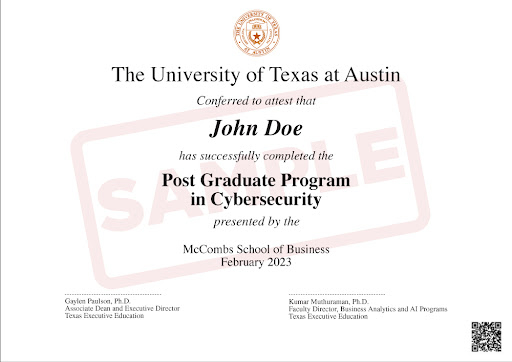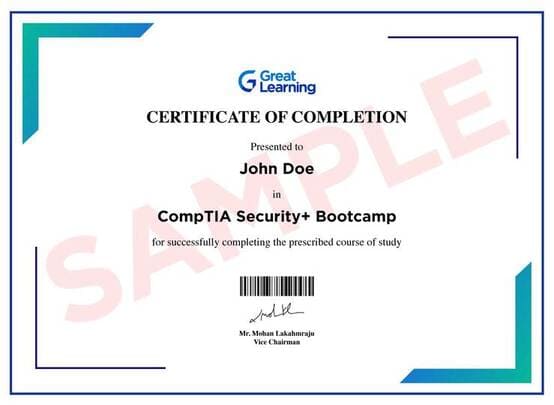Organizations must develop effective cyber safeguards to protect their reputation, finances, and valuable data from malicious hackers exploiting software vulnerabilities. A cybersecurity expert should be engaged in a competitive atmosphere of ever-changing defensive and offensive strategies and must be proficient in the subject to gain significant momentum and effectively secure IT infrastructures.
McCombs School of Business at UT Austin has collaborated with Great Learning to design the Post Graduate Program in Cybersecurity to provide you with the knowledge and skills needed to analyze attacks and design secure cybersecurity systems with the University of Texas at Austin, adding advantage to your portfolio. The program allows cyber defense enthusiasts to meet with industry thought leaders and understand the techniques for defending digital infrastructure and be industry-ready when they walk out of the program.
Key Highlights: Post Graduate Program in Cybersecurity
The Cybersecurity program curriculum has been created to equip learners with industry-relevant skills and prepare them for the transforming IT landscape. Major program highlights include:
A finely designed curriculum by world-class academia at the McCombs School of Business and lab sessions to gain a hands-on experience on the subject.
Live interactive mentorship with cybersecurity experts and committed program support from Great Learning.
- Portfolio Building Projects
Create a portfolio of coursework, tests, case studies, and industry-related projects in cybersecurity to demonstrate your expertise to prospective employers.
Cybersecurity Program Design
The program includes four modules and a capstone project. A pre-work is included at the beginning of the program to help recent graduates and non-IT learners understand the fundamentals of cybersecurity before delving deeply into the core of cyberattacks. As you understand the attacks, you will learn to design the security measures required to create a robust system.
This program will begin with fundamental concepts such as Risk Management, Cryptography, Network Security, and Cloud Security and will then discuss advanced cybersecurity concepts like Cyber Attacks, Security Operations, and Incident Management. It will also help you learn to Design Security Controls and be ahead of attackers and counter cyber attacks.
Learning Outcomes
Upon completion of the UT Austin Cybersecurity certificate program, you would have acquired the expertise required to:
- Establish a security mindset.
- Investigate the occurrence to determine the threat's origin.
- Evaluate the risk and respond.
- Report case studies and experiments professionally.
- Get acquainted with the Standards and Frameworks of cyber defenses.
- Demonstrate an awareness to identify and defend against modern-day threats like Ransomware.
- Understand the growing threat landscape by studying the most significant cyber attacks.
- Develop skills to handle cyberattacks by keeping to incident response playbooks.
Career Impact
McCombs School of Business at Texas at UT Austin offers the Cybersecurity program in collaboration with Great Learning globally to tackle modern threats with industry best practices. Learning Cybersecurity concepts that adopt the latest practices and being skilled at performing threat control activities will open you to more extensive opportunities in the corporate and government sectors.
Companies worldwide are addressing cyber threats by retraining their workforce, hiring knowledgeable cybersecurity specialists, and establishing strong cyber defense capabilities. You will be amongst the small percentage that is globally skilled at designing security solutions, suiting to 3.5million jobs, with an average salary of $103,590 for skilled cybersecurity professionals.
Additionally, the PGP in Cybersecurity curriculum aids in preparing students for CompTIA Security+, CompTIA, Cybersecurity Analyst (CySA+), and EC-Council Certified SOC Analyst (CSA) certifications.
Who is this Cybersecurity certificate program for?
The curriculum is created by renowned faculty at UT Austin to meet a range of professional requirements. This program will help you match your learning to your professional objectives, whether you're a mid-level IT professional trying to transfer into cybersecurity or an early career professional looking to establish a career in the field. The program is ideal for:
- Graduates and Early Career Professionals
- Building a strong foundation with in-demand market skills while learning cybersecurity fundamentals.
- Professionals from Technology and IT Fields
The program includes an overview of the top cyber defense techniques to assess the threat environment and advance your cybersecurity knowledge.
Eligibility Criteria for learning this online Cybersecurity Program
- Graduates with no prior IT experience
- Working professionals in any field
- Learners with 2 years of professional experience in the IT industry
An online cybersecurity course pre-work is offered to recent graduates and non-IT candidates to help them build foundational skills needed for the program and be at pace with learners from IT backgrounds.
Where can you see yourself after a Cybersecurity Program through UT Austin?
After learning Cybersecurity course through UT Austin, you can enter the modern cybersecurity professional roles that the current industry is yearning for.
You will be capable of guiding your team within your organization as:
- Cybersecurity Analyst: A Cybersecurity Analyst defends against hackers on a company's networks, software, and hardware. The analyst's primary duties include fully comprehending the company's IT architecture, monitoring it constantly, and evaluating risks that could potentially breach the network.
- Cyber Threat Intelligence Analyst: Information security specialists known as Cyber Treat Intelligent Analysts gather and analyze threat data to produce intelligence in the form of reports that they share with the relevant department.
- Information Security Specialist: An expert with in-depth knowledge and understanding of cyber threats, identity theft, and root cause analysis.
- SOC Specialist: An analyst in a security operations center serves a crucial role in modern security teams. SOC analysts are at the forefront of cyber defense, quickly spotting and retaliating to threats.
- Incident Response Professional: An incident responder, also known as a CSIRT Engineer or Intrusion Analyst, examines and analyzes a wide range of digital aberrations using a variety of computer forensic tools with the goal of discovering a breach attempt or the presence of an advanced persistent threat within the organization's systems.
- Professional Cloud Security Analyst: An individual within the organization that assesses security services and technology, analyses and publishes information security policies and processes, conducts security risk assessments, and offers monitoring and oversight for alerts in the cloud environment.
About McCombs School of Business at the University of Texas at Austin
The McCombs School of Business at the University of Texas at Austin is a top business school at a renowned public research university, catering to 51,000+ students from 3000+ world-class faculties. The University of Texas at Austin is perceived across the globe as a pioneer in the fields of social science, business, technology, and science. It encourages the growth of ideas and ethical leaders through excellent education, practical learning, and the pursuit of pertinent, ground-breaking research. With a solid track record of success, innovative research, and innovative teaching methods, you can be confident that you are learning from the top academicians and researchers.




































